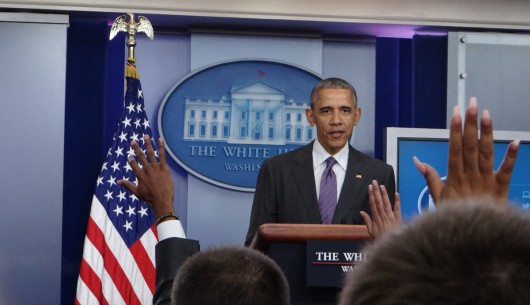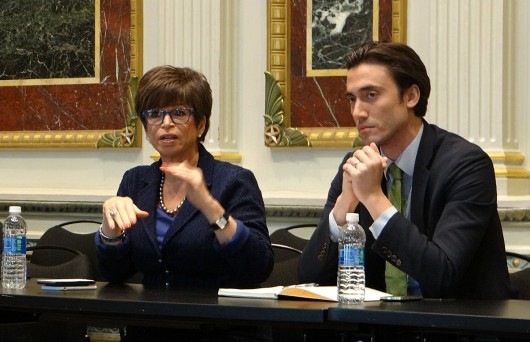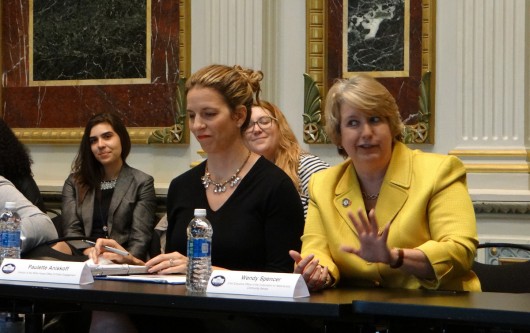
Collegiate reporters raise their hands to ask President Barack Obama questions in the White House’s James S. Brady Press Briefing Room on College Reporter Day, April 28. Credit: Alex Drummer | Managing Editor for Content
The White House hosted its first-ever College Reporter Day on Thursday.
From the blue chairs of the James S. Brady Press Briefing Room in the West Wing to the immaculate Indian Treaty Room of the Eisenhower Executive Office Building, about 50 students from various college media outlets across the county spent the day listening to White House leaders, including President Barack Obama in a surprise appearance.
Topics of discussion included sexual assault on college campuses, college access and affordability, and civic engagement, among other things.
Sexual assault

Valerie Jarrett (left) and Kyle Lierman discuss sexual assault on college campuses with collegiate reporters in the Indian Treaty Room on April 28. Credit: Alex Drummer | Managing Editor for Content
Senior Adviser to the President Valerie Jarrett and Associate Director of Public Engagement Kyle Lierman joined students for a discussion about the “It’s On Us” campaign.
The campaign aims to “end the sexual assault epidemic on college campuses,” Jarrett said.
The initiative has worked with students, university administrators, academics, advocates and survivors, and there’s a reason they feel the need to include so many people, she said.
“It’s a cultural change, and in order to change the culture, we need everyone involved,” Jarrett said. “And so that’s why we came up with the name ‘It’s On Us.’”
Another area they have focused on is including men, Lierman said.
The ‘It’s On Us’ campaign has made engaged students at more than 500 universities, according to a fact sheet provided to reporters.
Vice President Joe Biden and “The Hunger Games” star Josh Hutcherson made a stop at Ohio State for the ‘It’s On Us’ campaign in September.
When the discussion at the White House was opened for questions, one reporter asked about the inclusivity of “It’s On Us” and whether the campaign works to combat same-sex assault as well.
“Assault is assault. I don’t care it’s a man and woman, two women, two men — assault is assault. And our policies are here to protect all students,” Jarrett said.
“We wrote ‘It’s On Us’ in a way that all the language is gender-neutral,” Lierman added.
When sexual assault was brought up during the press briefing with Press Secretary Josh Earnest, he said sexual assault is “pervasive on college campuses.”
Earnest noted that the administration has seen more and more students stepping up to tackle this issue as a priority in recent years.
“And I think it is fair to say that on too many college campuses, administrators have been a little late to the game,” he said.
Access and affordability
Once the president greeted student reporters after walking in during Earnest’s briefing, Obama’s first topic of conversation was college affordability.
“I know that’s a big priority for a lot of (college) listeners and readers. And that’s one of the reasons why my administration has spent a lot of time focused on college affordability,” he said.
After explaining a couple actions the administration has taken, Obama announced it is “aiming to enroll two million more people in Pay As You Earn by this time next year.”
The Pay As Your Earn program “ensures that people can cap the amount that they’re repaying on their loans each month so that young people who want to go into jobs that aren’t as lucrative are still able to pursue their passions and their dreams while managing their debt load,” Obama said.
One of the ways Obama advocated for cutting college costs was for more high school students to have the opportunity to take courses for college credit at local community colleges and universities.

(Left to right) Roberto Rodriguez, John King and Ajita Menon speak to reporters about college affordability in the Indian Treaty Room on April 28. Credit: Alex Drummer | Managing Editor for Content
This way, he said, if a student goes on to a four-year institution, that student is more likely to be able to graduate in three years, and “by eliminating one year, means that you’ve just reduced your costs significantly.”
A discussion surrounding college access and affordability also took place earlier in the day when reporters had the chance to listen to and ask questions of Secretary of Education John King, Deputy Assistant to the President for Education Roberto Rodriguez, Executive Director of First Lady Michelle Obama’s Reach Higher Initiative Eric Waldo and Special Assistant to the President for Higher Education Policy Ajita Menon.
Civic engagement
CEO of the Corporation for National and Community Service Wendy Spencer and Deputy Assistant to the President and Director of the Office of Public Engagement Paulette Aniskoff held a discussion with reporters surrounding civic engagement.
Spencer shared the relationship between college and volunteering.

Paulette Aniskoff (left) and Wendy Spencer speak to students about civic engagement in the Indian Treaty Room on April 28. Credit: Alex Drummer | Managing Editor for Content
“Students in the age level of college, up to 24, volunteer at twice the rate of the same age group who are not attending college.”
“Now that’s good and bad,” she said.
Spencer said she finds it amazing that college students who are often holding jobs to pay for the cost of college, involved in an active social life and studying for classes find the time to also volunteer.
On the other hand, though, noncollege students of the same age group are not volunteering much. She said this is a problem that needs attention because there’s a new study “that proves if you volunteer and you’re looking for work — you’re unemployed and looking for work — you increase the likelihood of getting the job by 27 percent.”
During the press briefing, Obama alluded to his passion of increasing civic engagement among young people.
When asked about his plans after the presidency, he said he is too busy to think of that now but noted, “Typically, presidents build libraries, but I’m more interested in the programming, not just the building.”
“And I’m very confident that a lot of the programming that I do will relate to young people and how I can encourage them to get involved in civic life,” Obama said.


